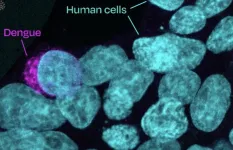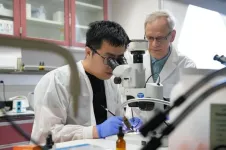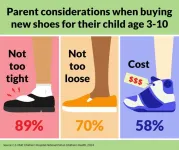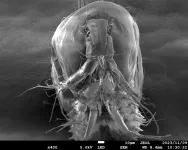(Press-News.org) Research Highlights:
Adults in their 50s with peripheral artery disease or PAD — are more likely than adults older than 80 to undergo leg amputation one to five years after an emergency surgery to restore blood flow to the lower limbs.
This study analyzes outcomes among patients older than age 50 hospitalized with PAD, as noted in eight years of data collected in England.
Researchers say early diagnosis, risk factor modification and treatment are warranted to help prevent patients from developing severe forms of PAD.
Embargoed until 4 a.m. CT/5 a.m. ET Monday, July 22, 2024
DALLAS, July 22, 2024 — People in their 50s with severe peripheral artery disease or PAD may be more likely than people in their 80s to undergo leg amputation one to five years after emergency surgery to restore blood flow to the lower limbs, according to new research published today in the American Heart Association’s flagship journal Circulation.
Peripheral artery disease occurs when the arteries leading away from the heart narrow due to cholesterol deposits, preventing adequate blood flow throughout the body — commonly the lower extremities. The condition is estimated to affect 10 million to 12 million adults ages 40 and older in the U.S., according to 2024 guidelines from the American Heart Association and the American College of Cardiology.
Symptomatic PAD is characterized by painful muscle cramping in the hips, thighs, calves, or feet when walking, climbing stairs or exercising. The pain does not subside with rest. Modifiable risk factors for PAD include being a smoker, or former smoker, having diabetes, hypertension and/or abnormal cholesterol.
“People with severe forms of PAD requiring urgent surgery tend to have extremely poor disease progress. They are at high risk of limb loss and all-cause death following the initial surgery,” said study lead author Qiuju Li, Ph.D., a research fellow in medical statistics at the London School of Hygiene and Tropical Medicine in the United Kingdom. “Our primary finding is different from the traditional belief that older people were at an increased risk of major amputation. Our study, interestingly, shows the opposite relationship.”
This study analyzed previous data from nearly 95,000 adults older than age 50 with peripheral artery disease who had surgery to restore blood flow (known as revascularization) between 2013 and 2020 in England. The analysis projected the possibility of major limb amputation and death after revascularization. Major limb amputation was defined as leg amputation above the ankle.
Two-thirds of participants in the data review had undergone surgery to restore blood flow during an elective hospital admission, while the remainder had non-elective surgery during an emergency hospital admission. The analysis noted that:
The risk of major amputation among emergency admissions among patients between 50- to 54-years-old was 18% one year after revascularization and 28.8% five years after the surgery.
The risk of major amputation under the same circumstances for patients between ages 80 and 84-years-old was 11.9% at one year and 17% at five years.
Among patients who underwent a revascularization during an elective hospitalization, the risk of major amputation remained comparatively low regardless of the patient’s age: 10.8% for those 50- to 54-years-old, and 6.5% for those 80- to 84-years-old at five years.
However, the risk of death without a major amputation increased substantially among older patients after both elective and non-elective revascularizations: 48.7% and 58.9%, respectively, for patients between ages 80-84 at 5 years, vs. 12.9% and 16.9%, respectively, for those ages 50- 54 at 5 years.
After major amputation, the data showed participants were at an increased risk of death if they had undergone major amputation within six months of the revascularization.
More specifically, for participants between ages 80-84, the 1-year death rates after major amputation were 39.2% and 29.8% if they underwent major amputation at 3 months and 1 year, respectively, after revascularization, whereas the corresponding death rates were 20.3% and 14.9%, respectively, for those between ages 50 and 54.
“The findings also highlight how the association between the illness trajectories and patient characteristics is not straightforward,” Li said. “While being older at the time they had blood flow-restoring surgery was associated with a marked increase in the risk of death, the risk of major amputation after that surgery was lower among older patients rather than younger patients.”
In May 2024, joint guidelines from the American Heart Association, the American College of Cardiology and nine other medical societies highlighted the importance of early diagnosis and treatment to prevent amputation and other cardiovascular complications from lower extremity peripheral artery disease. The guidelines also called for coordinated care from a multispecialty team to treat the condition.
“This study shows that for patients with severe peripheral arterial disease, there is not one simple answer that can explain each patient’s condition,” said guidelines co-vice chair Philip Goodney, M.D., M.S., professor and section chief of Vascular Surgery at Dartmouth Health in New Hampshire. “For example, patients with severe disease who present at young ages have poor outcomes, irrespective of how they might be treated. This may be the result of severe disease or difficult circumstances for treatment. Either way, this information can help guide clinicians and researchers in determining the best treatments for these high-risk individuals. Similarly, the study also shows that older patients with moderate to severe disease can have good results when trying to prevent an amputation. Overall, these findings make it clear – in treatment for PAD, it is not ‘one size fits all.’”
This analysis had several limitations that may have affected the results. The data review did not account for subsequent surgeries to restore blood flow after the initial surgery; it could not account for disease severity or whether amputation occurred on the leg that underwent the initial surgery or the other leg; and race or ethnicity was not considered due to unreliable information from the database.
Study details and background:
The data review included 94,690 people with peripheral artery disease who underwent surgery to restore blood flow to the lower limbs between April 2013 and March 2020 in England.
Participants were ages 50 and older, the median age was 72 years and 66% of participants were men.
Data was collected from the Hospital Episode Statistics Admitted Patient Care database in England.
A statistical model was created from the data to describe patterns of survival after an initial lower limb revascularization; if and when patients experienced major amputation; and survival after amputation.
In total, 10.0% patients underwent major amputation during the follow-up period, which ended in March 2021. Of these, two thirds were emergency patients at time they were admitted to the hospital, and more than half had died by the end of study.
The revascularization procedure was labelled elective if performed during an elective admission, and non-elective if performed during an emergency admission or after transfer from another hospital.
Co-authors, disclosures and funding sources are listed in the manuscript.
Studies published in the American Heart Association’s scientific journals are peer-reviewed. The statements and conclusions in each manuscript are solely those of the study authors and do not necessarily reflect the Association’s policy or position. The Association makes no representation or guarantee as to their accuracy or reliability. The Association receives funding primarily from individuals; foundations and corporations (including pharmaceutical, device manufacturers and other companies) also make donations and fund specific Association programs and events. The Association has strict policies to prevent these relationships from influencing the science content. Revenues from pharmaceutical and biotech companies, device manufacturers and health insurance providers and the Association’s overall financial information are available here.
Additional Resources:
Multimedia is available on the right column of release link http://newsroom.heart.org/news/people-in-their-50s-are-at-higher-amputation-risk-than-older-people-after-leg-surgery?preview=9c3a05f6b3556e08775d358e98a2fdbb
After July 22, 2024, view the manuscript online.
AHA health information video: Peripheral Artery Disease (PAD) Symptoms and Risk Factors
AHA news release: Early diagnosis & treatment of peripheral artery disease essential to improve outcomes, reduce amputation risk (May 2024)
AHA health information (Spanish): What is Peripheral Artery Disease?
AHA health resources: PAD National Action Plan
Follow AHA/ASA news on X @HeartNews
Follow news from AHA’s flagship journal Circulation @CircAHA
###
About the American Heart Association
The American Heart Association is a relentless force for a world of longer, healthier lives. We are dedicated to ensuring equitable health in all communities. Through collaboration with numerous organizations, and powered by millions of volunteers, we fund innovative research, advocate for the public’s health and share lifesaving resources. The Dallas-based organization has been a leading source of health information for a century. During 2024 - our Centennial year - we celebrate our rich 100-year history and accomplishments. As we forge ahead into our second century of bold discovery and impact, our vision is to advance health and hope for everyone, everywhere. Connect with us on heart.org, Facebook, X or by calling 1-800-AHA-USA1.
END
People in their 50s are at higher amputation risk than older people after leg surgery
Adults aged 50-54 with severely narrowed leg arteries had a higher risk of amputation after emergency surgery on leg arteries than people aged 80-84, according to an analysis in the journal Circulation
2024-07-22
ELSE PRESS RELEASES FROM THIS DATE:
Exposing dengue’s invasion strategies
2024-07-22
KANSAS CITY, MO—July 22, 2024—Mosquito-borne viral infections once confined to tropical regions are spreading. Dengue virus infects up to 400 million people worldwide each year according to World Health Organization estimates, and no available treatments exist for this disease. Now, research from the Stowers Institute for Medical Research has uncovered surprising strategies for how dengue and hundreds of other viruses replicate in their hosts, with the potential to aid in developing novel antiviral treatments and vaccines.
Led by Stowers Predoctoral Researcher Luciana ...
Under embargo: Smell of human stress affects dogs’ emotions leading them to make more pessimistic choices
2024-07-22
Peer reviewed: Yes
Type of evidence: Observational study
Subject: Animals
UNDER STRICT EMBARGO until 10:00 hours [UK BST] / 05:00 hours [US EDT] Monday 22 July 2024
Smell of human stress affects dogs’ emotions leading them to make more pessimistic choices
Dogs experience emotional contagion from the smell of human stress, leading them to make more ‘pessimistic’ choices, new research finds. The University of Bristol-led study, published in Scientific Reports today [22 July], is the first to test how human stress odours affect dogs' learning and emotional state.
Evidence in humans suggests that the smell of a stressed ...
Blood proteins predict the risk of developing more than 60 diseases
2024-07-22
Research on thousands of proteins measured from a drop of blood demonstrates the ability of proteins to predict the onset of many diverse diseases.
The research, published today (22 July 2024) in Nature Medicine, was carried out as part of an international research partnership between GSK, Queen Mary University of London, University College London, Cambridge University and the Berlin Institute of Health at Charité Universitätsmedizin, Germany.
The researchers used data from the UK Biobank Pharma Proteomics Project (UKB-PPP), ...
Virginia Tech researchers find potential method to control mosquito populations through genetic breeding
2024-07-22
Virginia Tech researchers have found a new way to identify genetic targets useful for control of mosquito populations, potentially offering an alternative to insecticides.
Their study, published today in Communications Biology, focused on the genetic basis of species incompatibility. They crossed Ae. aegypti, a major global arboviral disease vector, and its sibling species, Ae. mascarensis, from the Indian Ocean. When offspring is crossed back with one parent, about 10 percent of the progeny becomes intersex and is unable to reproduce.
The researchers identified abnormalities in the sex determination pathways of these ...
Amsterdam UMC set to lead large-scale European study into preventing burnout due to stress among staff in and around the operating theatre
2024-07-22
On average, healthcare professionals involved in surgical procedures and care in hospitals experience more stress and burnout than other professional groups in Europe. An estimated 60% of these caregivers are showing symptoms of burnout, while up to half of nurses are considering leaving their profession. To address this, thanks to a Horizon Grant of almost 6.5 million euros, Amsterdam UMC will lead a European consortium in search of the best solutions to stress.
"Healthcare providers involved in surgical procedures are under enormous pressure. Think of surgeons, nurses, theatre assistants, anesthesiologists. They ...
National Poll: Some parents not confident their kids are wearing the right shoes
2024-07-22
ANN ARBOR, Mich. – As children grow, it may feel like they’re constantly outgrowing one clothing item essential for so many activities: their shoes.
But many parents in a new national poll acknowledge a lack of confidence in ensuring their children are wearing properly fitting shoes – which experts say is necessary to support growth and prevent injuries.
One in seven parents also say they’ve had concerns about their child’s feet or the way they walk while one in 10 parents report their child ...
Eco-friendly treatment saves squid eggs from newfound parasite
2024-07-22
Raising squid in aquaculture has been a challenge that researchers have tried to address for many decades without meaningful success. Squid are highly sensitive to changes in water flow, are vulnerable to disease, have complex life cycles and hard-to-meet food preferences, and can become aggressive towards each other, all of which make them difficult to rear. At the same time, the population of wild squid is plummeting due to overfishing and climate change, and in Japan alone, it’s estimated ...
Quit Googling and take naps to cut dementia risk, says AI expert
2024-07-22
People can reduce their risk of age-related dementia by exercising their brains properly instead of Googling, according to a leading Canadian academic.
Professor Mohamed I. Elmasry says simple daily habits such as afternoon naps, memory ‘workouts’ and not reaching for a smartphone can increase the odds of healthy aging.
His new book, iMind: Artificial and Real Intelligence (with foreword by Canadian cell biologist Dr. Aileen Burford-Mason), says the focus has shifted too far away from RI (natural, or real) intelligence in favor of ...
Duke-NUS launches LIVE Ventures, a S$20 million incubator to accelerate research commercialisation
2024-07-22
New incubator aims to tap industry experts to bridge the knowledge and funding gap to enhance bench-to-bedside success
LIVE Ventures provides up to $500,000 for high-potential academic research projects
Duke-NUS Medical School today launched LIVE Ventures, a S$20 million incubation programme designed to catalyse the commercialisation of innovative academic research. Focused on translating scientific breakthroughs into clinical applications, LIVE Ventures will provide Duke-NUS scientists conducting ...
Samuel Pepys’ fashion prints reveal his guilty pleasure: Fancy French clothes
2024-07-22
University of Cambridge media release
UNDER STRICT EMBARGO UNTIL 00:01AM (UK TIME) ON MONDAY 22ND JULY 2024
A collection of French fashion engravings offers precious new insights into the life of Samuel Pepys years after his premature final diary entry. The prints show the tailor’s son remained fascinated by the power of fashion long after he had secured wealth and status. But they also expose Pepys’ internal conflict over French style.
Most of what we know about Samuel ...
LAST 30 PRESS RELEASES:
Brainwaves of mothers and children synchronize when playing together – even in an acquired language
A holiday to better recovery
Cal Poly’s fifth Climate Solutions Now conference to take place Feb. 23-27
Mask-wearing during COVID-19 linked to reduced air pollution–triggered heart attack risk in Japan
Achieving cross-coupling reactions of fatty amide reduction radicals via iridium-photorelay catalysis and other strategies
Shorter may be sweeter: Study finds 15-second health ads can curb junk food cravings
Family relationships identified in Stone Age graves on Gotland
Effectiveness of exercise to ease osteoarthritis symptoms likely minimal and transient
Cost of copper must rise double to meet basic copper needs
A gel for wounds that won’t heal
Iron, carbon, and the art of toxic cleanup
Organic soil amendments work together to help sandy soils hold water longer, study finds
Hidden carbon in mangrove soils may play a larger role in climate regulation than previously thought
Weight-loss wonder pills prompt scrutiny of key ingredient
Nonprofit leader Diane Dodge to receive 2026 Penn Nursing Renfield Foundation Award for Global Women’s Health
Maternal smoking during pregnancy may be linked to higher blood pressure in children, NIH study finds
New Lund model aims to shorten the path to life-saving cell and gene therapies
Researchers create ultra-stretchable, liquid-repellent materials via laser ablation
Combining AI with OCT shows potential for detecting lipid-rich plaques in coronary arteries
SeaCast revolutionizes Mediterranean Sea forecasting with AI-powered speed and accuracy
JMIR Publications’ JMIR Bioinformatics and Biotechnology invites submissions on Bridging Data, AI, and Innovation to Transform Health
Honey bees navigate more precisely than previously thought
Air pollution may directly contribute to Alzheimer’s disease
Study finds early imaging after pediatric UTIs may do more harm than good
UC San Diego Health joins national research for maternal-fetal care
New biomarker predicts chemotherapy response in triple-negative breast cancer
Treatment algorithms featured in Brain Trauma Foundation’s update of guidelines for care of patients with penetrating traumatic brain injury
Over 40% of musicians experience tinnitus; hearing loss and hyperacusis also significantly elevated
Artificial intelligence predicts colorectal cancer risk in ulcerative colitis patients
Mayo Clinic installs first magnetic nanoparticle hyperthermia system for cancer research in the US
[Press-News.org] People in their 50s are at higher amputation risk than older people after leg surgeryAdults aged 50-54 with severely narrowed leg arteries had a higher risk of amputation after emergency surgery on leg arteries than people aged 80-84, according to an analysis in the journal Circulation





